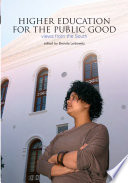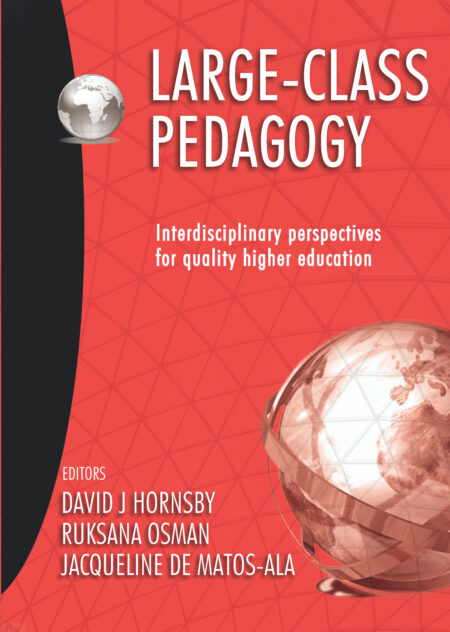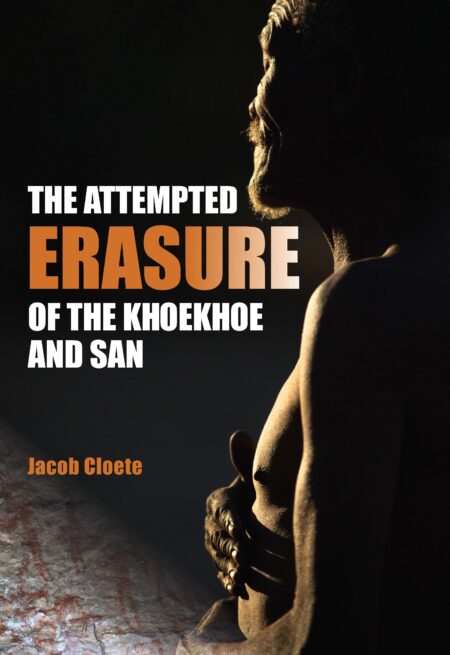-

Higher Education for the Public Good
0R340,00The authors of this inspiring collection discuss philosophical approaches and present empirical and practical ideas for teaching and learning at university for the public good.
Four major aspects of transforming universities are explored: the purpose and ethos of the university; its conception of graduate attributes; the way programmes and teaching are delivered; and the institution’s approach to academics and their professional development. The book will be indispensable to all universities who are evaluating their own principles and practice.
-

Higher Education in South Africa
0R420,00Higher Education in South Africa should be of considerable interest to higher education researchers outside of South Africa, as well as within, for the general and comparative assessments it makes. The South African higher education researchers included within its covers have clearly engaged with research and writing from many parts of the world, which they have then applied to make sense of their own condition. – Malcolm Tight Lancaster University, UK
Print: View Print Version
-

Higher Education in South Africa
0R420,00Higher Education in South Africa should be of considerable interest to higher education researchers outside of South Africa, as well as within, for the general and comparative assessments it makes. The South African higher education researchers included within its covers have clearly engaged with research and writing from many parts of the world, which they have then applied to make sense of their own condition. – Malcolm Tight Lancaster University, UK
eBook: View eBook Version
-

Inclusive Teaching in South Africa
0R275,00Inclusive education presupposes an all-inclusive approach where all learners are taught in regular classrooms, regardless of background, disability or social context. While there has been much debate, indications are that inclusive education has been gaining momentum. The book is divided into six coherent sections that address the how of inclusive education both inside and outside of the classroom.
eBook: View eBook Version
-

Inclusive Teaching in South Africa
0R0,00Inclusive education presupposes an all-inclusive approach where all learners are taught in regular classrooms, regardless of background, disability or social context. While there has been much debate, indications are that inclusive education has been gaining momentum. The book is divided into six coherent sections that address the how of inclusive education both inside and outside of the classroom.
Print: View Print Version
-

Knowledge Beyond Colour Lines
0R395,00Knowledge remains timely in education. The need for academics to contemplate its relevance, worth, use and everything in-between deems a continuous intellectual project, rather than a conundrum to be solved. This book takes the South African context by the horns as it challenges the often dormant and traditionalist ways in which higher education spaces see knowledge. Through original research and the voices of academics and students, this book argues for repurposing knowledge generation, knowledge sharing and critical pedagogy so that more inclusive teaching and learning environments can be both imagined and sustained. The contentious tensionalities that this creates for LoLT and SoTL, in particular, are unlocked so as to trouble the South African higher education landscape with the intent to proffer alternative pathways for a knowledge beyond colour lines.
Prof Shan Simmonds (PhD)
NWU
This edited volume bristles with fresh scholarly approaches and insights of an emergent generation of engaged scholars grappling with the issues and problems of higher education in South Africa. The issues dealt with here are varied and encompassing. They are treated with intellectual delicacy and probing sensitivity, articulacy, informed data and bold conclusions. They serve well!
Prof. Kwesi Kwaa Prah, Emeritus Professor of Sociology, University of the Western Cape
Founder of the Centre for Advanced Studies of African Society
eBook: View eBook Version
-

Knowledge Beyond Colour Lines
0R315,00Knowledge remains timely in education. The need for academics to contemplate its relevance, worth, use and everything in-between deems a continuous intellectual project, rather than a conundrum to be solved. This book takes the South African context by the horns as it challenges the often dormant and traditionalist ways in which higher education spaces see knowledge. Through original research and the voices of academics and students, this book argues for repurposing knowledge generation, knowledge sharing and critical pedagogy so that more inclusive teaching and learning environments can be both imagined and sustained. The contentious tensionalities that this creates for LoLT and SoTL, in particular, are unlocked so as to trouble the South African higher education landscape with the intent to proffer alternative pathways for a knowledge beyond colour lines.
Prof Shan Simmonds (PhD)
NWU
This edited volume bristles with fresh scholarly approaches and insights of an emergent generation of engaged scholars grappling with the issues and problems of higher education in South Africa. The issues dealt with here are varied and encompassing. They are treated with intellectual delicacy and probing sensitivity, articulacy, informed data and bold conclusions. They serve well!
Prof. Kwesi Kwaa Prah
Emeritus Professor of Sociology, University of the Western Cape
Founder of the Centre for Advanced Studies of African Society
Print: View Print Version
-

Large-class Pedagogy
0R290,00I highly recommend this edited collection. It is a timely intervention when universities around the world are facing changes akin to the newspaper industry a decade ago. The authors remind us of the potential power of the lecture and that there does not need to be a trade off between the size of the class and the quality of the delivery… Professor James Arvanitakis 2012 recipient of the Prime Minister’s Teaching and Learning Award, University of Western Sydney, Australia This is the first book of its kind that considers the complex issues of large classes. As such, it makes a very important contribution and provides a deep insight into large class pedagogy from a conceptual and practical perspective. Dr Mandia Menits Massey University, New Zealand If the thought of teaching large classes fills you with dread; if you think that pedagogic innovation is impossible in the face of burgeoning student numbers; or if you simply wish to understand more about the dynamics of this increasingly common environment in Higher Education, then this is the book for you. Written by highly experienced academics, it is a valuable (and long overdue!) resource for supporting good practice in the large class context. Dr Jenny Hadingham University of Rochester, New York
eBook: View eBook Version
-

Large-class Pedagogy
0R0,00I highly recommend this edited collection. It is a timely intervention when universities around the world are facing changes akin to the newspaper industry a decade ago. The authors remind us of the potential power of the lecture and that there does not need to be a trade off between the size of the class and the quality of the delivery… Professor James Arvanitakis 2012 recipient of the Prime Minister’s Teaching and Learning Award, University of Western Sydney, Australia This is the first book of its kind that considers the complex issues of large classes. As such, it makes a very important contribution and provides a deep insight into large class pedagogy from a conceptual and practical perspective. Dr Mandia Menits Massey University, New Zealand If the thought of teaching large classes fills you with dread; if you think that pedagogic innovation is impossible in the face of burgeoning student numbers; or if you simply wish to understand more about the dynamics of this increasingly common environment in Higher Education, then this is the book for you. Written by highly experienced academics, it is a valuable (and long overdue!) resource for supporting good practice in the large class context. Dr Jenny Hadingham University of Rochester, New York
Print: View Print Version
-

Learning to teach in post-apartheid South Africa
0R0,00Teacher education programmes seek to provide student teachers with the knowledge and expertise to provide qualtiy teaching and learning in a diverse and challenging school context. Learning to Teach in post-apartheid South Africa: Student Teachers’ Encounters with Initial Teacher Education addresses the complexities of teacher education programmes in preparing students to teach. It adds to the knowledge about teacher education, contributing critical understanding of education and the schooling system. The book provides important insights to deepen researchers, academics, teacher education providers, policy-makers, and students’ understanding of the importance to address equity, redress, and quality in South African educaiton in a post-apartheid era. This book further helps to build student teachers’ capacities to work creatively and to become active and critical agents of transformation. It ultimately outlines the challenges face in designing and delivering successful Inital Teacher Education programmes, and the impact this has on delivering equitable and qualtiy education.
Print: View Print Version
-

Making Connections
0R260,00Because of the disconnect within the curriculum and the lack of contextual relevance, African theological education is still searching for appropriate approaches to ministerial training. Integrative theological education refers to systematic attempts to connect major learning experiences appropriate to the education and formation of ministers. It is seen as a solution to connect and transform ministry training. The main premise of this book is that the key to enhancing theological education is the intentional integration of knowing with being and doing, of theory with practice, and of theology with life and ministry. In this way, all aspects of student learning are brought together holistically, highlighting an educational strategy that is concerned with connections in human experience, thereby supporting student learning. Making Connections offers the opportunity to consider integration as an appropriate pedagogical approach, to create the correct balance in making education more meaningful and fulfilling for the African, revealing humanising education grounded in African philosophy and worldview.
Print: View Print Version
-

Multilingual classroom contexts
0R350,00By far the majority of South African students get their schooling in a second language, which means that our classrooms areEmultilingual. This state of affairs is not exclusive to our country, as can be seen in the many academic conferences on multilingual learning and teaching. Terms like translanguaging and biliteracy appear in many articles and books that discuss the role language in education. What makes the multilingual nature of our South African classrooms challenging, is the fact that many learners switch from one language of learning and teaching to another at various points in their school career: from home language to English or Afrikaans after the foundation phase, from one language of learning and teaching to another when they move to new schools, high school or tertiary institutions. This book is an attempt to highlight the transitions; from home to school, from foundation to intermediate phase, from primary to high school, and from high school to tertiary institutions.
eBook: View eBook Version


